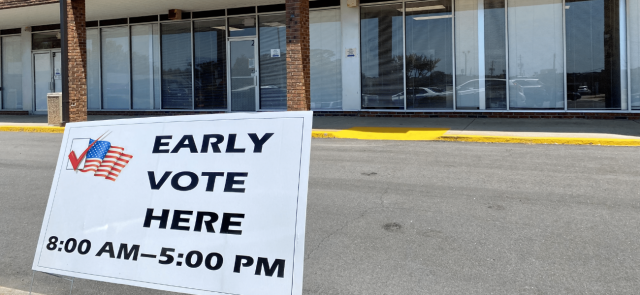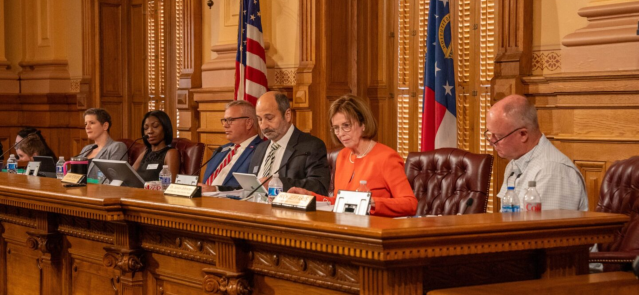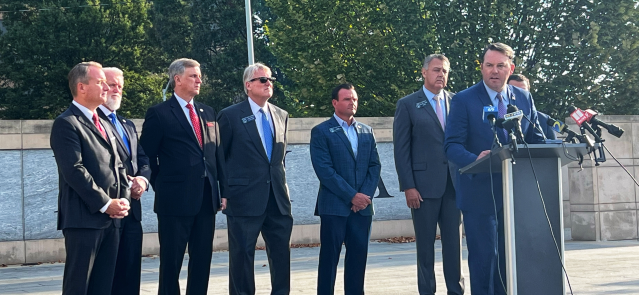Stay ahead of the curve as a political insider with deep policy analysis, daily briefings and policy-shaping tools.
Request a Demo
Attendees gather at the National Conference of State Legislatures summit. (Credit: NCSL)
- Tax relief, particularly property tax cuts and business incentives, leads 2024 policies
- States focus on teacher pay, at-risk student funding, reducing property tax reliance
- Declining revenues, economic uncertainty, demographic changes among top concerns
LOUISVILLE, Ky. — Tax policy, K-12 education funding and housing are among this year’s top issues noted by state fiscal analysts across the country.
Along with state economic conditions and long-term liabilities, those topics are top of mind for legislative fiscal offices, a senior policy analyst with the National Conference of State Legislatures said Tuesday. Eric Syverson said the list — which will be released in a forthcoming report — comes from a new database the organization is compiling.
In 2024, the top tax policy implemented by states was property tax relief, Syverson said. Other popular policies included income tax cuts, business incentives, tax benefits for families and sales tax exemptions:
- Fifteen states enacted property tax relief this year, Syverson said. Those cuts came primarily as homestead exemptions, either broad or targeted. For example, Kansas exempted the first $75,000 of home value from a homeowner’s property tax bill.
- Many states implemented new income taxes or accelerated previously enacted cuts. Syverson said there were fewer cuts this year than last year, but states are still cutting income taxes at a historically high pace.
- There’s been increased interest by legislatures in using tax policy to help families with children, particularly to address the cost of child care. For example, Georgia, Kansas and Wisconsin made those types of tax benefits more generous this year. Syverson predicted more federal action on child tax credits in 2025.
- Six states enacted business-specific sales tax exemptions this year, and seven did so for certain goods and services.
A ‘reality check’ on some concerns
Michael D’Arcy, director of U.S. public finance for Fitch Ratings, gave attendees at the NCSL session a “reality check” on some of the top concerns identified by policymakers: declining revenues, economic uncertainty, demographic changes, structural deficits and state credit ratings.
The top concern, declining state revenue, is a very real issue, D’Arcy said. Revenue declined for 16 states in the last fiscal year, and year-over-year revenue growth across all states has decelerated.
Some of those declines are the result of economic conditions. But D’Arcy said it’s a “largely engineered phenomenon” because of states’ recently enacted tax cuts.
There are reasons for concern over the economy, but D’Arcy said Fitch is skeptical of some of the economic indicators that point to a coming recession. For example, he said recent increases in the U.S. unemployment rate are a “statistical anomaly” because the numbers are driven by an increase in young, unskilled immigrant workers.
Fitch doesn’t have any states on a negative outlook, and no state’s credit rating is in an “immediate danger of going down,” D’Arcy said.
As for structural deficits — where a government consistently spends more than it makes in revenue — Fitch’s state credit team doesn’t see reason for concern over the next few years. D’Arcy said the “economy would have to really hit a recession” for those deficits to become major problems.
‘Unprecedented’ teacher pay growth
Teacher compensation was the top K-12 education funding issue identified by state fiscal analysts.
There’s been “unprecedented” increases in teacher salaries over the past few years, said Michelle Exstrom, director of the National Conference of State Legislatures’ education program. The growth rate of teacher compensation has caught up with the private sector for the first time in years.
In 2023 and 2024, lawmakers across the country introduced 191 bills addressing special student populations — such as special education, English-language learners and at-risk students — the most of any education topic.
Part of that figure includes a new trend, Exstrom said: funding specifically to help homeless students, a group that graduates at significantly lower rates.
The biggest outstanding at-risk funding issue? Exstrom said states are still trying to figure out how to ensure the money actually goes to those particular student groups after it’s sent to school districts.
Other major school funding issues in 2024 include reducing schools’ reliance on property tax revenue, reforms to school funding formulas and big efforts to rethink schooling, including through avenues such as voucher programs and community schools.
Other issues: Long-term liabilities, housing
State and local governments reported $3 trillion in long-term debt as of 2021, according to Fatima Yousofi, a principal associate for Pew Charitable Trusts. The good news, she said, is that states have made progress in recent years, particularly in funding their pension liabilities.
Additionally, deferred costs of infrastructure maintenance are estimated to be in the range of $1 trillion to $2 trillion.
Yousofi said climate change will add to that bill through various avenues, including road and bridge repair and updates to states’ water systems.
Heather Wilson, a senior policy specialist for the National Conference of State Legislatures, said the four primary ways states are addressing the nation’s housing shortage are through stability, easing zoning restrictions, development incentives and efforts to increase home ownership.
State lawmakers have introduced 1,913 housing-related bills so far this year, Wilson said, and 336 have passed.
She cited the Joint Center for Housing Studies’ 2024 report, which showed the nation is 1.5 million units short of meeting its housing needs and no state has a sufficient supply of affordable rental housing.
Brett Stover is a Statehouse reporter at State Affairs Pro Kansas/Hawver’s Capitol Report. Reach him at [email protected] or on X @BrettStoverKS.
Presidential race aside, what’s at stake for Georgians in the November election?
The Gist Despite all 236 members of the state House and Senate up for reelection in November, the presidential race has taken center stage in Georgia with the nomination of Vice President Kamala Harris for U.S. president. Nonetheless, Georgia Democrats will be in a push-and-pull contest to gain more seats in both the House and …
Election administrators ‘in limbo’ over new voting rules, top official says
If you plan to hand-deliver your absentee ballot to your local election office this year, you’ll have to show identification and sign a form stating whose ballot you’re dropping off, under a new rule recently passed by the State Election Board. If you fail to show your ID or don’t complete the form, your ballot …
Weekend Read: State Election Board marks its 60th year mired in controversy. Here’s what happened.
In 1964, Georgia lawmakers retooled the state’s election process to create a “one person, one vote” system after the U.S. Supreme Court outlawed the “county unit system” that held sway over Peach State politics for nearly half a century. Until then, politicians hoping to win primaries in Georgia had to capture entire counties, not just …
State lawmakers: Atlanta, give detention center to Fulton to fix problem-plagued jail
Atlanta city officials need to give the Atlanta Detention Center to Fulton County to ease overcrowding in the county’s violence-prone jail, a bipartisan panel of state lawmakers said in its final report, released Friday. “A big part of the solution is that the City of Atlanta needs to turn over the Atlanta Detention Center to …




